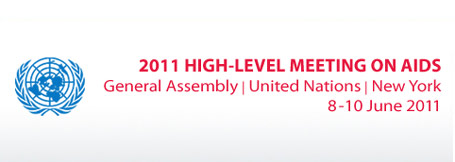The following is a statement issued by the Global Forum on MSM & HIV (MSMGF) on Jun 10:
The Global Forum on MSM & HIV (MSMGF) welcomes the progress represented in the new 2011 United Nations Political Declaration on HIV and AIDS, expected to be formally adopted later today at the conclusion of this week's High Level Meeting on AIDS in New York. Issued as a consensus statement with support anticipated from all UN member states, the declaration is the first General Assembly statement on AIDS to explicitly include men who have sex with men (MSM), breaking a pervasive silence about this population at the official level and creating unprecedented opportunities for advocacy to promote MSM health and human rights.
"The inclusion of men who have sex with men and other key populations is a major turning point in the global political discourse that has dominated the first 30 years of global HIV response," said Dr. George Ayala, Executive Officer of the MSMGF. "Political leadership is finally catching up with public health evidence. With HIV rates among MSM now surpassing thirty percent in countries from Asia to the Caribbean, this language is well overdue."
The declaration sets forth a series of principles and recommendations for an enhanced response to HIV. Calling for a tailored, evidence-based approach, the document recognizes that the full realization of human rights for all people is an essential part of the global AIDS response. The declaration also commits to the creation of enabling legal, social and policy frameworks to promote access to essential services, as well as the review of laws and policies that adversely impact the equitable delivery of HIV prevention, treatment, care and support.
"Human rights violations, legal barriers and discrimination have played a central role in blocking MSM from accessing life-saving services," said Krista Lauer, Policy Associate at the MSMGF. "With fewer than one in ten MSM around the world able to access even the most basic prevention and treatment, this declaration has the potential to make a major difference for MSM. After 30 years of trying to control the epidemic with generalized responses, the document signals a shift toward policies and programs that respond to communities at highest risk, an approach shown to be both more effective and more cost-efficient."
By adopting these and other strategies, the declaration makes a number of time-bound commitments, including reaching 15 million people with anti-retroviral drugs by 2015.
The negotiations leading up to the adoption of the declaration considered questions of culture, sovereignty, and religious values, and a number of provisions included in the final text could potentially undermine or dilute a targeted focus on MSM and other key populations. In addition, while the declaration acknowledges MSM, sex workers, and people who inject drugs by name, transgender people were omitted from the document despite infection rates of over 30% in some locations.
"There is obviously a long way to go," said Dr. Ayala. "The document is not perfect, but it makes strong commitments to very important goals and sets forth a number of solid principles to achieve them. It is now up to civil society to work together to hold governments accountable. The prevention and treatment goals enshrined in this document cannot be met unless the global AIDS response is re-shaped to address MSM and other key populations."
The Global Forum on MSM & HIV (MSMGF) is an expanding network of AIDS organizations, MSM networks, and advocates committed to ensuring robust coverage of and equitable access to effective HIV prevention, care, treatment, and support services tailored to the needs of gay men and other MSM. Guided by a Steering Committee of 20 members from 18 countries situated mainly in the Global South, and with administrative and fiscal support from AIDS Project Los Angeles (APLA), the MSMGF works to promote MSM health and human rights worldwide through advocacy, information exchange, knowledge production, networking, and capacity building.

